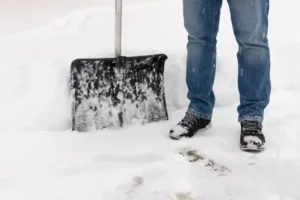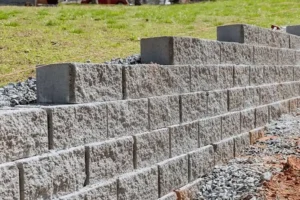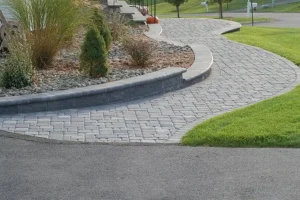If you live in Omaha, NE, or nearby areas like Gretna and Bennington, you know how unpredictable the weather can be. Hot summers, chilly winters, and the occasional surprise storm can really take a toll on your outdoor spaces.
That’s why choosing the right mulch for your landscape beds—and ensuring proper mulching installation—is key. It’s not just about aesthetics; the right approach helps protect your property, supports healthy plants, and keeps your yard looking its best all year long.
With so many mulch products available—from chocolate mulch to river rock—it’s easy to get lost in the options. But when you understand which types work best for Nebraska’s climate and how to install them properly, you’ll get results that last. Let’s answer some big questions you might have.
What Mulch Works Best in Omaha’s Weather?
Omaha’s weather can swing from sizzling summers to icy winters, so picking the right mulch means finding one that can handle both extremes while keeping your yard looking great.
Organic Mulch Options for Omaha
Shredded hardwood mulch: Breaks down over time, adding organic matter and nutrients to your soil while helping with moisture retention. Great for improving soil health in your landscape bed.
Cedar mulch: Naturally resistant to pests and has a pleasant scent. It works well for Omaha’s hot summers because it doesn’t break down too quickly.
Chocolate mulch: A rich brown color that makes shrubs and flowers pop. It’s a favorite among property owners in Omaha for its polished look.
Compost mulch blend: Perfect for improving nutrient levels and keeping the soil temperature more stable during Nebraska’s harsh temperatures.
Inorganic Mulch Options for Omaha
River rock: Durable and long-lasting, making it ideal for areas where you don’t want frequent replacement. It also helps with drainage in wetter spots.
Granite chips: Premium appearance with excellent soil erosion control. Works best in areas with high wind or heavy runoff.
How Thick Should You Apply Mulch in Omaha, NE?
For most mulch products in Omaha, NE, a 2–4 inch layer works best. Anything thinner allows weeds to sneak in, while anything thicker can make it harder for your plants to breathe. Since many organic mulch options break down over time, it’s best to replenish your mulch each year to keep it working effectively.
Spring is also a great time to check your mulch, as winter can cause it to shift or compress, making it the perfect moment to refresh your beds and prepare your property for the warmer months ahead.
What’s the Best Way to Install Mulch in Your Landscape Beds?
Here are some steps for Professional Mulch Installation in Omaha:
Step 1. Clear the area: Remove weeds, debris, and any old mulch that has decomposed into a soggy mess.
Step 2. Edge the bed: Creating a clean edge keeps mulch in place and gives your property a tidy, finished look.
Step 3. Apply mulch evenly: Spread your chosen mulch product in a consistent layer to prevent bare patches.
Step 4. Keep mulch away from trunks: Leaving a small gap around trees and shrubs helps prevent rot and pest problems.
Should You Choose Organic or Inorganic Mulch?
Organic mulch
Best for adding nutrients, improving soil health, and creating a softer, natural appearance. Needs to be replenished more often.
Inorganic mulch
Best for long-term coverage, low maintenance, and areas where you don’t want frequent changes. Doesn’t break down, so it won’t add nutrients to the soil.
I was having a bit of trouble deciding whether to go for organic or inorganic mulch for my large lawn in Omaha, NE. I wanted something that would help keep the weeds down and improve the overall health of my soil, but I wasn’t sure which type of mulch would be best.
After speaking with the experts at ShurLawn & Landscape, they helped me understand the key differences. I had initially considered organic mulch because it would add nutrients to the soil and improve its health over time. However, I learned that organic mulch needs to be replenished more frequently, which could be a bit of a hassle for my large lawn.
On the other hand, I found that inorganic mulch, while not adding nutrients, would provide long-term coverage and require very little maintenance. This option seemed ideal for certain parts of my yard where I didn’t need to worry about frequent changes or soil health, like along my lawn paths.
ShurLawn & Landscape helped me find the perfect balance by suggesting that I use a combination of both types of mulch. For the areas where I wanted to enrich the soil and support plant growth, they recommended organic mulch, while for the low-maintenance spots like pathways and landscape borders, inorganic mulch would do the job without much upkeep.
I’m really happy with the solution, and my lawn looks great now with the mulch providing excellent coverage and helping to maintain the beauty of my yard. Thanks to ShurLawn & Landscape, I didn’t have to worry about which mulch to choose, and they made the process super easy.
– Emily Harris, Maple Drive, Omaha, NE.
Can Mulch Installation Help with Drainage and Soil Erosion?
Yes, absolutely. Adding mulch (especially shredded hardwood or river rock) helps slow water movement, which reduces erosion. It also allows water to soak into the ground more evenly, helping with drainage.
Mulch works with your landscape’s natural slopes, so when installed correctly by a contractor, it can be part of a larger plan to protect your outdoor areas from runoff problems.
What Mulch Products Do Property Owners in Omaha Prefer?
Chocolate mulch
Stylish, rich color, and perfect for creating a high-contrast look around shrubs.
Cedar mulch
Long-lasting with a fresh scent.
River rock
Durable and heavy enough to withstand Nebraska’s winds.
Compost blend
Helps improve the soil for long-term plant health.
How Often Should You Replenish Mulch in Your Landscape Beds?
Most property owners in Omaha refresh their mulch annually. Organic mulch breaks down over time, adding nutrients to the soil, but that means you’ll need to install mulch again to maintain its protective layer.
For inorganic mulch like river rock or granite, replenishing is only needed if pieces shift or get buried.
Tips from an Expert Mulch Installation Contractor in Omaha
- Know your mulch options: Different types of mulch work better for different areas of your property.
- Think about color: Match mulch colors to your home’s style and the plants in your landscape bed.
- Maintenance plan: Organic mulch needs to be replenished, and inorganic mulch needs occasional cleanup.
- Work with experts: A team of experts can help you choose, install, and maintain mulch so your outdoor spaces stay looking their best.
Conclusion
Choosing the right mulch for Omaha’s climate is about more than looks—it’s about protecting your soil, reducing weeds, improving drainage, and helping your plants handle Nebraska’s temperature swings.
From chocolate mulch for a polished appearance to river rock for long-lasting coverage, the right mulch product can keep your property in top shape.
If you’re ready to refresh your mulch, install mulch for the first time, or want expert advice, ShurLawn & Landscape is here to help. Call us today at 402-572-0710 to schedule an appointment!
We specialize in mulch installation services for commercial and residential properties in Omaha, Gretna, Bennington, and nearby areas in Nebraska. Our service includes pickup, delivery, and installation by a team of experts who know how to get the best results.
Frequently Asked Questions
1. What’s the best mulch for hot summers in Omaha?
Cedar mulch and chocolate mulch are popular choices because they retain moisture and keep roots cooler. They also last longer under harsh temperatures.
2. How often should I replenish my mulch?
Most property owners in Omaha replenish mulch annually, especially with organic mulch. Inorganic mulch, like river rock, only needs refreshing if it shifts.
3. Can mulch help stop weeds completely?
Mulch reduces weeds by blocking sunlight, but it won’t stop every single weed. Pair mulch with proper weed control for the best results.




